I love spicy food. And I love homemade, fermented hot sauces. I always have at least 3-4 different versions in stock, from super hot to fruity, you can find all of them at my house. And because in my little survey on instagram you asked me for more recipes for hot sauces, I proudly present my absolute super hit hot sauce - with super flavouring by sumac and pasilla.
INGREDIENTS I
- 1 tbsp. mustard seed
- 1 tbsp. colored pepper
- 1 tbsp. sumac
- 5 garlic cloves
- 1 white onion
- 1 red onion
- 5 dried tomatoes
- 2 fresh red chiles (with seeds)
- 1 fresh yellow habanero (with seeds)
- 1 red bell pepper
- 1 orange bell bell pepper
- 1 yellow bell pepper
- 1l H2O
- 20 gr. smoked salt
INGREDIENTS II
- 1 Chipotle Mora
- 1 Pasilla
- 2 tbsp. raw cane sugar
- 1 tsp. salt
- 150 ml spicy brine (see preparation)
PREPARATION
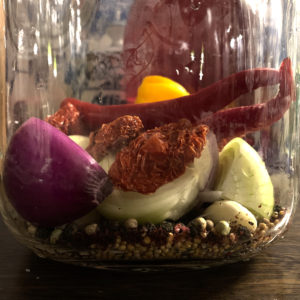
The smallest parts, i.e. mustard seed, pepper and sumac, are placed at the bottom of the glass so that as little as possible floats up and above the brine. Everything that is not covered by brine is susceptible to mold, and this is something that is to be avoided. Sumac is available in Turkish supermarkets. Do not leave it out, it gives the sauce a fresh lemon flavor.
I have used 2% salt for the brine. To get a bbq aroma, I recommend smoked salt for this ferment.
Add the peeled garlic cloves, sun-dried tomatoes, chilies and habanero peppers, from which I removed the stems beforehand, to the spices. Hot tip: wear gloves.
The onions and peppers are roughly chopped - onions in quarters, peppers in half sixths. Layer both in such a way that they overlap well, thus forming a barrier for the smaller ingredients.
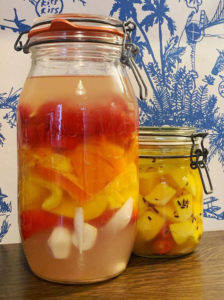
Since the peppers have a considerable buoyancy, you should put weights on top of them, otherwise everything will float up, push over the brine and most likely start to get moldy. And that would be just stupid.
What you use as weight doesn't really matter. I have some clay weights, they are heavy and practical. Even more I like to use the glass lids of canning jars, they are cheap, you can get them almost everywhere and because they are transparent, you always have a good view of the fermentation process.You just choose what you like best. I gathered some options for you at the basics of fermenting - there I also write how you should not do it. Since the peppers shrink by at least half in the fermentation process, it's important to pack the weights well so they don't slip as the fill level moves down. Therefore I categorized this ferment as advanced.
Now you have to let it ferment for at least 8 weeks before the ferment is processed into sauce.
––– B R E A K –––
After 8 weeks it is time to mix the chili sauce! To do this, rehydrate the dried Chipotle Mora and the Pasilla overnight in the brine of the ferment. It is enough to cover them well with liquid in a glass and shake the glass every now and then. At some point, they will absorb enough liquid to sink. The pasilla adds a wonderful aroma and raisin-sweet, pungent taste to the sauce, while the Chipotle Mora intensifies the smoky aroma.
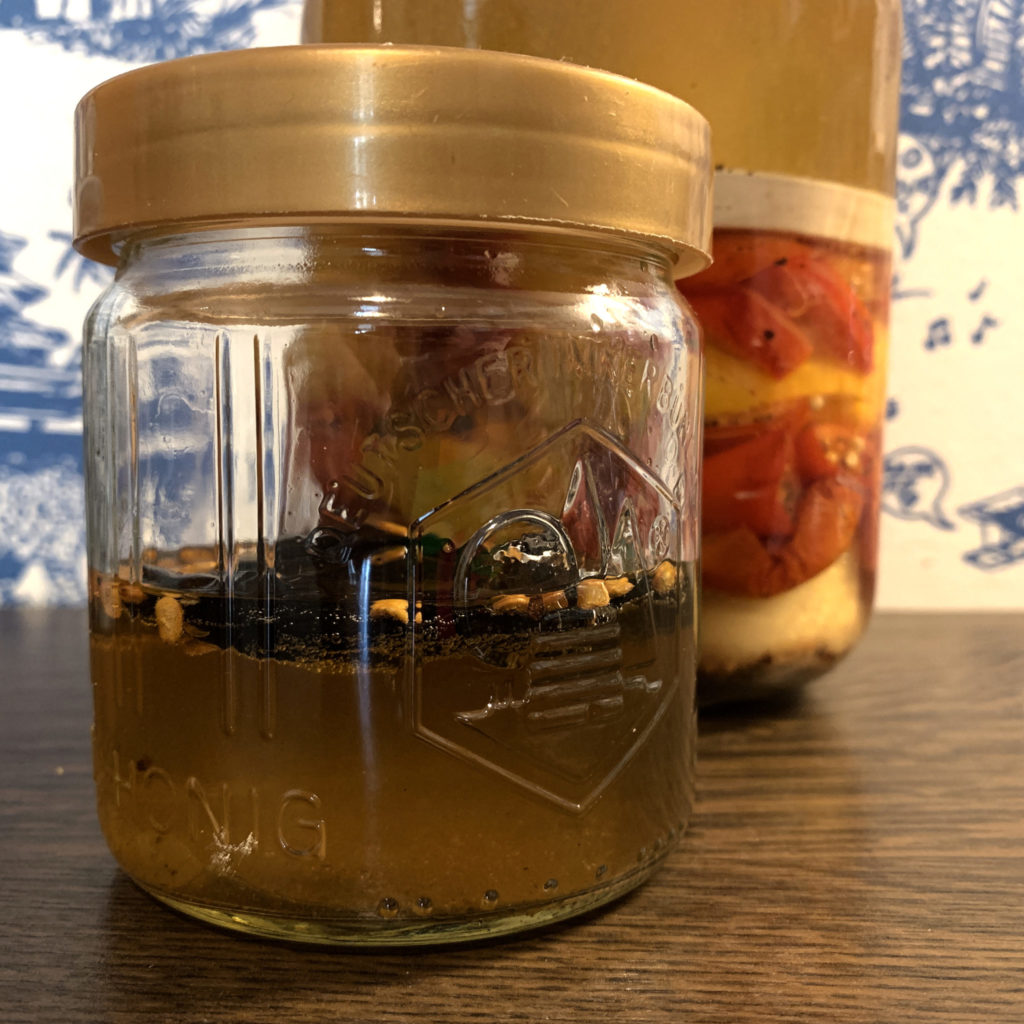
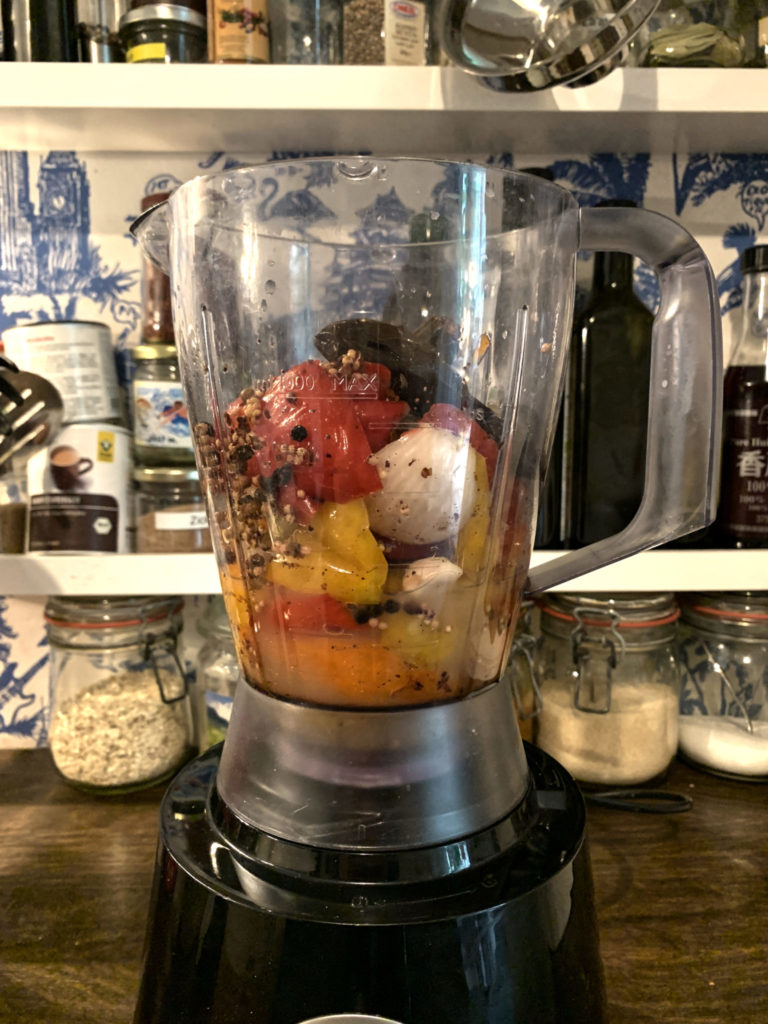
The next day, let the fermented vegetables and spices drip off sloppily with a strainer (i.e. do not separate the ferment thoroughly from the brine, this is not necessary) and then puree them together with 2 teaspoons raw cane sugar, 1 teaspoon salt, the soaked Chipotle Mora and Pasilla and about 150 ml of the obtained spicy brine. I prefer to do this in a blender. Sometimes you need more brine, sometimes less, depending on which consistency of the sauce you prefer. You can best decide for yourself.
Fill the finished chili sauce into vessels and store in the refrigerator until consumed. There the fermentation is slowed down but not stopped. When I use small screw-top jars I do not screw the lids super tight, because potential gases can still escape from the jars this way.
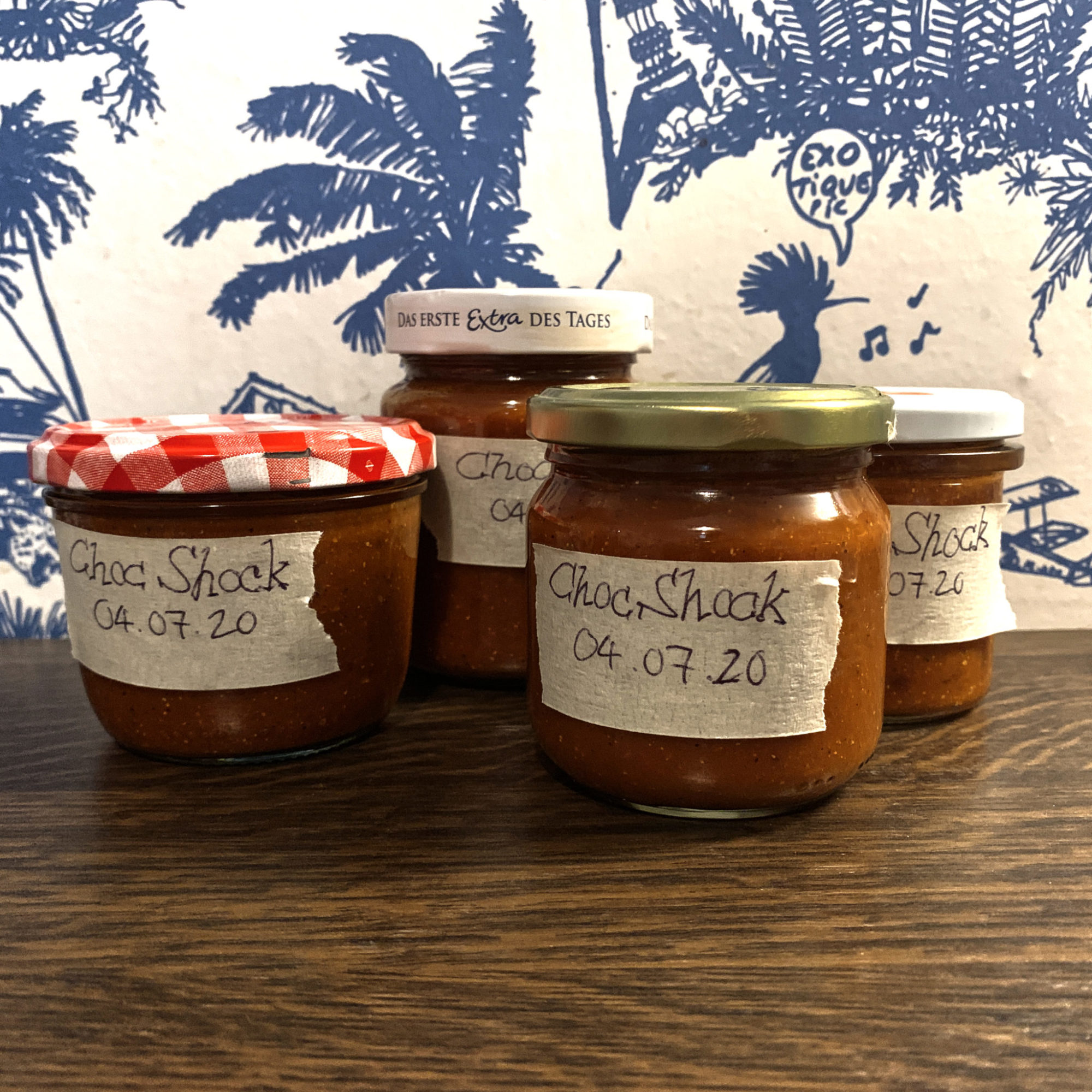
If the positive health aspects of raw fermented products are not of primary focus for you, you can also pasteurize the sauce by boiling it for 10-15 minutes. This slows down fermentation and preserves the taste. Mould and kahm yeast will no longer have a chance.
I appreciate the probiotic effects of raw, wild ferments and am happy to feed my gut bacteria with good products and have a versatile, living microbiome. But I can achieve this very well with sauerkraut, kimchi, carrots and several other of my ferments, so that the hot chili sauce may exceptionally do without living bacteria 😉

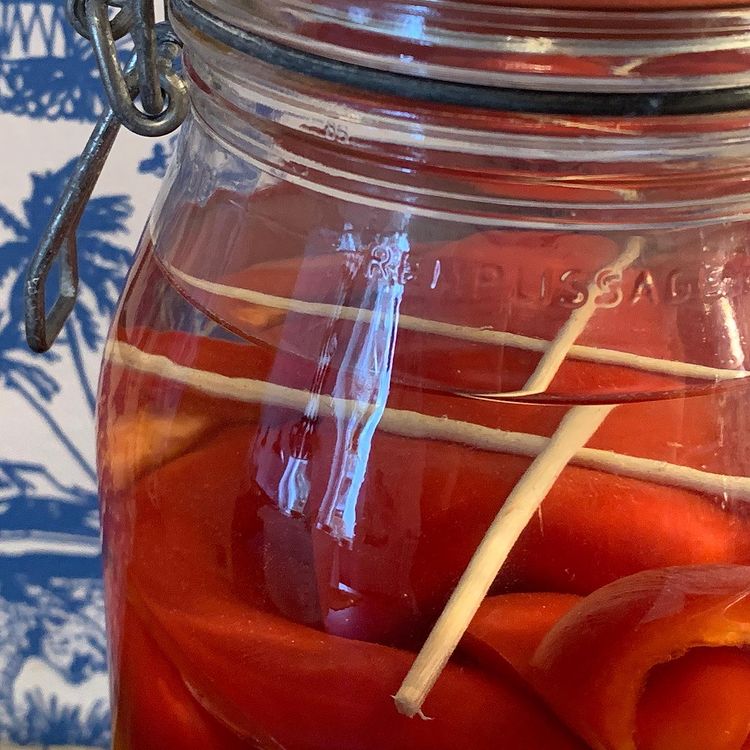
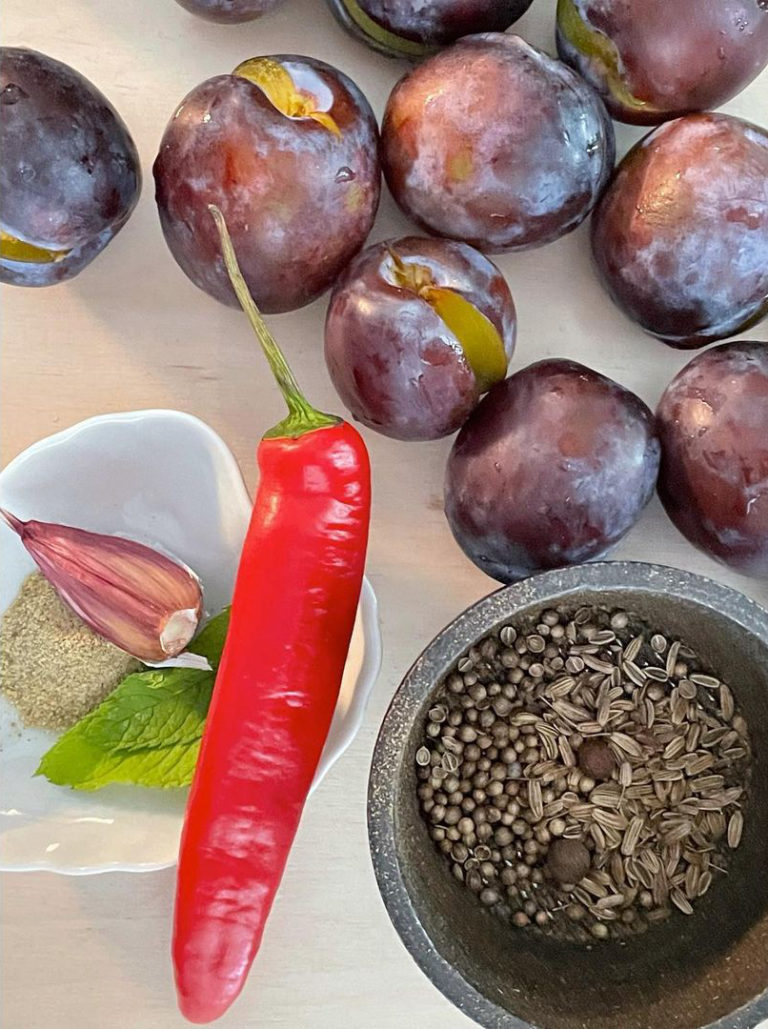
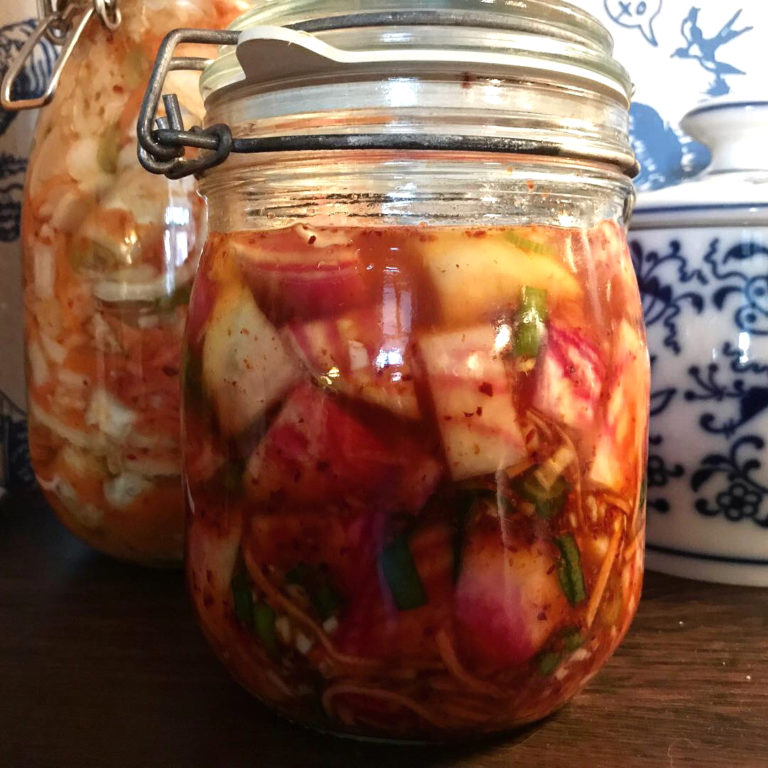
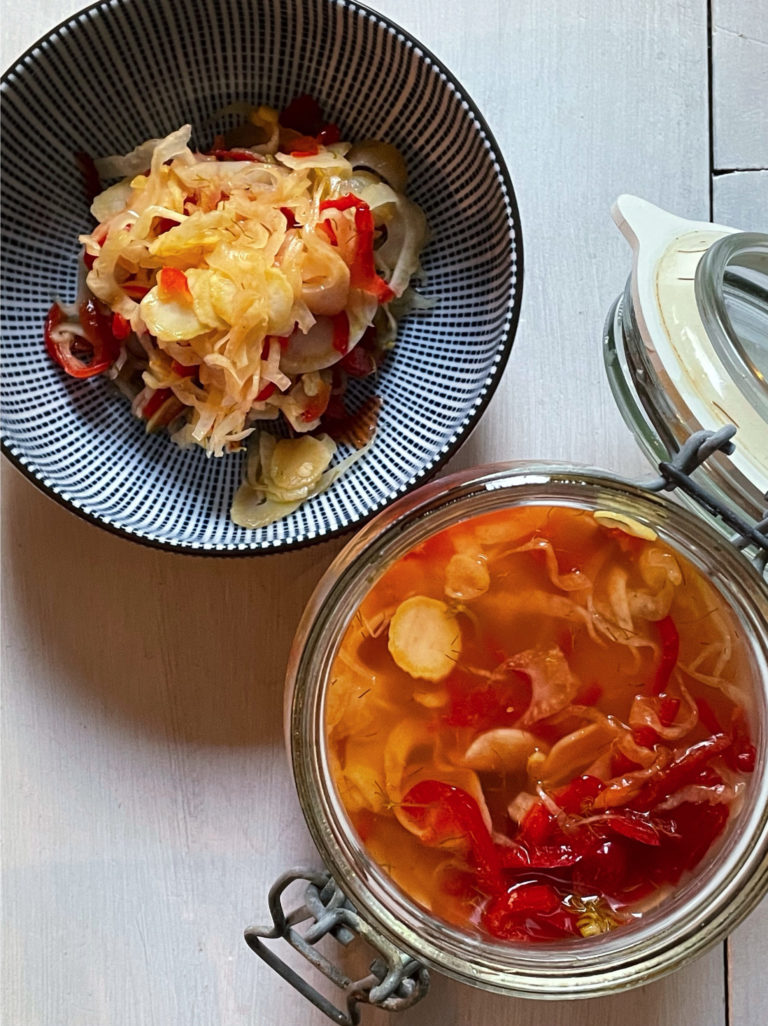
Danke du hast ja tolle Rezepte ich probier auch immer mal neues
Liebe Inge,
vielen Dank für das Kompliment <3!
Viele Grüsse und fröhliches Fermentieren,
Katsu
Super Rezept, habe das jetzt abgewandelt im ersten Ansatz.
Anstatt bunten Pfeffer habe ich Timut Pfeffer genommen, anstatt rote Chilis 4 ‚Lemon Drop‘ und anstatt Habanero eine ‚Scotch Bonnet‘, also alles auf Citrus…bin total gespannt!
Hej Tobias,
danke für das Lob! Ich habe das auch schon mit Lemon Drop gemacht, dann nur mit gelber Paprika wegen der Farbe und einem Hauch Zitronenschale. Hat auch richtig gut geschmeckt.
Dir auch gutes Gelingen!
Best regards,
Katsu
Hallo!
Vielen Dank für deine vielen tollen Rezepte! Ich probiere immer wieder eines aus, mal schmeckt es mir und manchmal ist es auch nicht so mein Geschmack.
Nun habe ich hier beim Rezept einfach verbaselt, ein Gewicht aufzusetzen und die Paprika sind über der Lake (vor einer Woche angesetzt). Ich schüttel es jeden Tag – das ist schon etwas aufwendig. Was meinst du könnte ich es nochmal öffnen zum Beschweren und dann weiter reifen lassen?
Viele Grüße, Lisa
Hej Lisa, nein, auf gar keinen Fall solltest du es jetzt öffnen, gerade Paprika sind sehr schimmelanfällig. Wenn es schon über eine Woche steht, sollte schon CO2 entstanden sein. Kannst du etwas hören, wenn du den Gumminippel etwas nach unten drückst?
Hallo Katsu!
Ne, zu hören ist nichts. Aber es hat gut geblubbert zu Beginn und Flüssigkeit oben raus gedrückt.
Wenn was rauskommt, war auch was zu hören – das hat dein Glas wohl heimlich gemacht. Bedeutet, dass CO2 entstanden ist, dann kann kein Schimmel entstehen. Du solltest safe sein.
Vielen Dank!
Dann warte ich noch die restlichen Wochen ab, bis es im Rezept weiter geht. 🙂
Hallo Katsu,
Meine Soße habe ich inzwischen fertig – leicht abgewandelt, weil ich bei uns nicht genau die Zutaten für den zweiten Schritt gefunden habe. Lecker!
Ich möchte dich noch fragen bzgl. Haltbarmachung: du kochst die fertige
Soße 10 Minuten und füllst nur heiß ab, ohne zusätzliches einkochen?
Vielen Dank für deine tolle Seite und die super Unterstützung hier in den Kommentaren!
Hej Lisa, ja, so mache ich das. Ich lagere sie aber auch kühl. Wenn du sie bei Raumtemperatur lagern möchtest, koche sie am besten nochmal ein. Gutes Gelingen! Katsu
Vielen Dank!